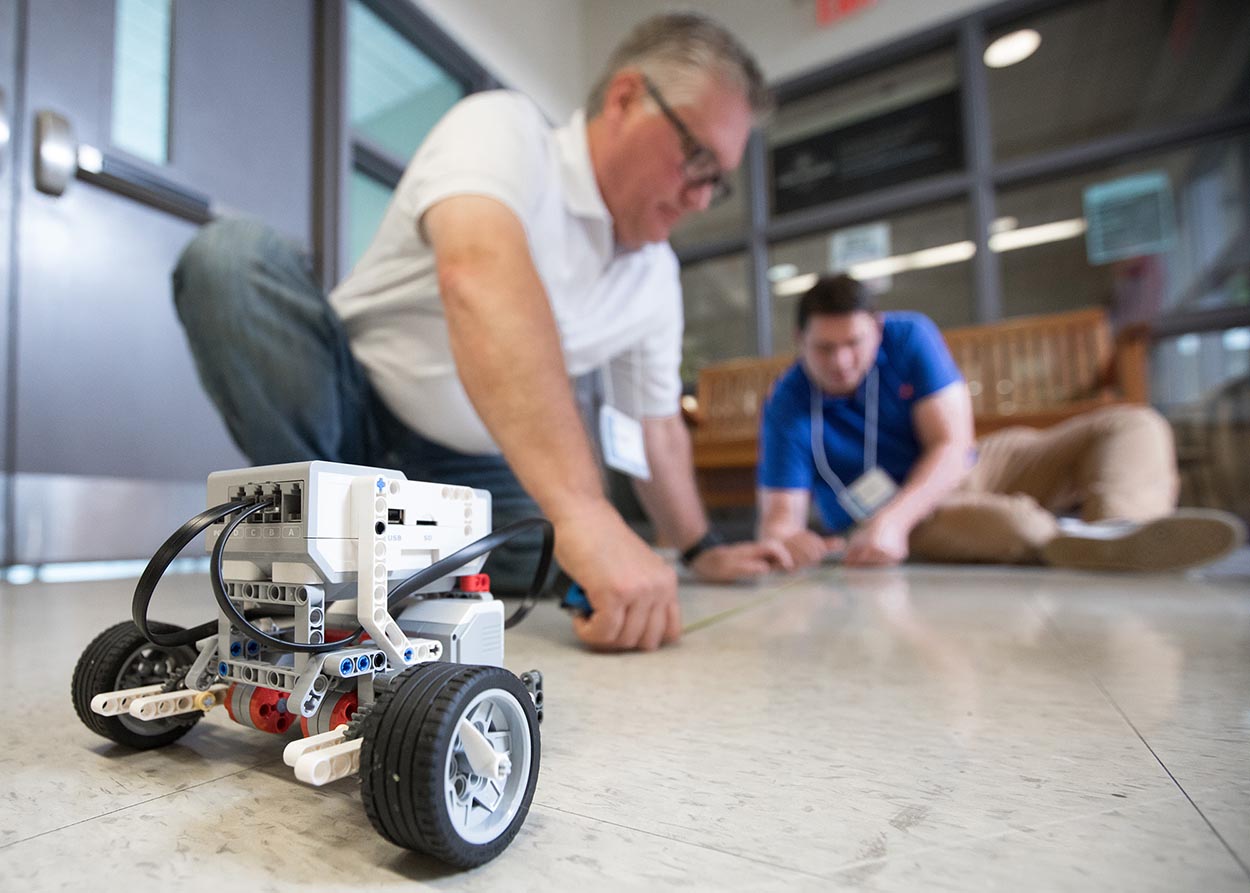Cal U hosted the Summer STEM Teacher Training Institute and Student Workshop June 17-29.

Scott Rhodes (left), a geometry teacher at Trinity Area High School, and Phillip Matsick, a math and algebra teacher at Brownsville Area Middle School, record data while working with a robotic vehicle.
Learning is not remembering. Teaching is not telling.
Under that guiding principle, students from nearby districts and teachers from the area and across the country gathered at California University of Pennsylvania June 17-29 for the Summer STEM Teacher Training Institute and Student Workshop, presented by the National Center for the Advancement of Education (nCASE).
nCASE works to increase U.S. competitiveness in the global economy by promoting innovative STEM education and helping teachers integrate technology into their classrooms.
Training is supported by the U.S. Department of Defense (DoD) and incorporates Defense Department scientists, engineers and other STEM professionals as it immerses teachers and students in inquiry- and design-based learning activities.
“We use teams because that’s the 21st-century workforce model,” said Nancy Priselac, nCASE director for programs and training. “Problems are solved more quickly and at a higher level with teams.”
“The DoD funds STEM education training because it hires a large percentage of scientists and engineers and needs to have a deep pool of potential applicants,” she said.
During the first week of the summer institute, teachers developed curriculum and learned teaching techniques in two modules: “Math with Robot I” and “Smart Sensors.”
Students arrived for week two. In the math module, they integrated robotics and worked in teams to perform hands-on activities to program, collect and analyze data, and compare and contrast attributes of different wheels and gears.
In the sensors module, teams investigated the behavior of pressure and heat-sensitive films and their roles in coin-counters and other sensing devices like interactive touch screens.
“Time is spent discovering,” said Dr. Anthony Pyzdrowski, a math professor at Cal U and an nCASE master teacher. “Activities and experiments are designed to understand the ‘whys.’ We’re teaching math, but we’re doing it by incorporating science, engineering and design.”
Geometry teacher Scott Rhodes was excited to integrate techniques into his classes at Trinity Area High School.
“Students don’t need you to give them the answers,” he said. “Our role is more to guide them in the right direction and let them get it on their own.”
Alexis Sherman, a California Area High School sophomore, enjoyed the team problem-solving approach.
“It was frustrating at first, but when we got to the chemistry behind it, it all clicked for me,” she said of the smart sensors module. “This is more hands-on, and each team had different ways of solving a problem. Teams are definitely way easier, and I wouldn’t have been able to stick with this if not for my teammates.”
Kristi Hayes attended from Gage Middle School in Los Angeles, Calif., where she teaches science and English. Her school has a focus on STEM education.
“I enjoyed the format where first you learn, and then you apply,” she said. “It reinforced the goal of teaching kids how to learn. We want to teach them how to learn, investigate and explore.”
Those from Cal U involved in the Summer STEM Institute were Pyzdrowski, Dr. Ghassan Salim, from Applied Engineering and Technology; Dr. Diane Fine, from Childhood Education; Dr. Kevin Koury, dean of the College of Education and Human Services; Dr. Len Colelli, associate provost and associate vice president for Academic Affairs; and Robert Prah and Jesse Maund from Military and Veterans Affairs.
Students Phillip Langley, who earned his bachelor’s degree in biology, his master’s degree in exercise physiology and is pursuing his master’s degree in conflict resolution, and Karlee Reeves, who majored in secondary education and is pursuing her master’s degree in special education with a concentration in applied behavior analysis, helped to manage the event.
The plan is to hold the nCASE Summer STEM Institute at Cal U for five years, with teachers and students invited back for expanded modules.
“This is learning by doing, and we want to spread that approach,” Colelli said.
“There is an enrollment piece to it, because teachers are a driver of enrollment, and having Cal U be even better known for STEM education will attract more students. We’d like to increase faculty involvement as well, because the inquiry-based models are useful in their classrooms, as well."
PTC was the corporate sponsor for the event. Aaron Tuomi, customer success senior director, and staff provided two evening presentations for teachers during the second week showcasing its emerging technologies. Tuomi also talked about the variety of future careers within PTC available to their students.
